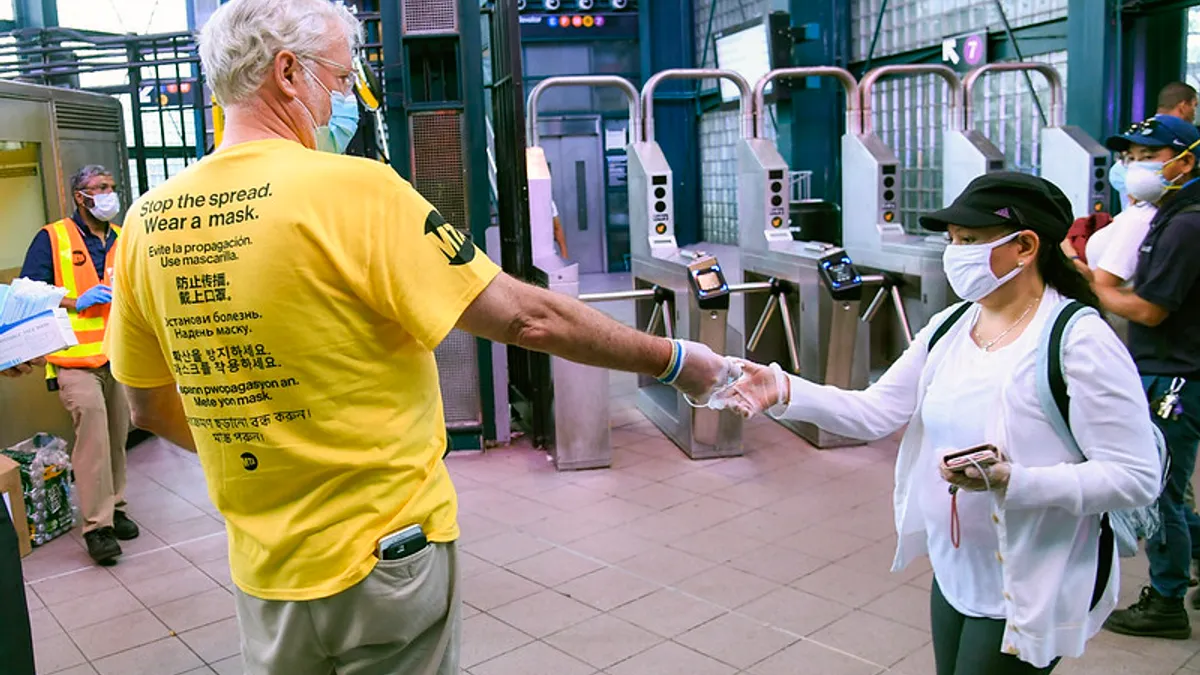Dive Brief:
- The American Public Transportation Association (APTA) is calling on Congress to provide at least $32 billion in emergency funding as U.S. transit agencies struggle to stay afloat and support more than 400,000 industry employees.
- Nearly half of public transit agencies are now offering their full pre-coronavirus services, compared to just 17% of agencies in April, according to a new APTA survey of 121 public transit agencies. But despite the recent influx in service, 62% of agencies are suspending or not enforcing fare collection.
- The survey also found that nearly one-third of transit agencies have furloughed or are planning to furlough workers; over one-third of agencies delayed capital projects; and one in five agencies have moved funds from their capital budget to operating budgets.
Dive Insight:
APTA's calls for $32 billion in funding follow the Senate Republicans' proposed $1 trillion coronavirus relief package that "has no mention of reauthorizing the federal highway and transit programs," Engineering News-Record reports. The latest proposals "ignore the dire situation facing the public transportation industry," APTA President and CEO Paul Skoutelas said in a statement.
"Public transit agencies need additional funding to continue to provide essential services throughout the crisis and play an indispensable role in America’s economic recovery from COVID-19," he said.
Alex Gibson, innovation manager at Ford Mobility company TransLoc, echoed Skoutelas' sentiments. "The immediate consequences of not adding additional investments into public transportation today are incredibly damaging, but the long-term impact will be devastating to the future prosperity of American communities," he said in an emailed statement.
The Chicago Transit Authority (CTA) is losing almost $1 million in fare box revenue per day, as its ridership dropped 80% below normal levels at the height of the city’s stay-at-home orders, CTA President Dorval Carter said on a Tuesday APTA press call.
The CTA received $817 million from the coronavirus relief package at the beginning of the pandemic, which ensured full service operations this year and into early next year, he said. However the CTA is projecting it will need $1.5 billion in aid to make it through the next two years, or else the agency will be forced to make "catastrophic" decisions about its service, he said.
"Public transportation isn’t a sidebar conversation for recovery, it is needed at the forefront for that recovery," Carter said.
Despite challenges highlighted in the APTA survey, its results also highlight improvements to safety measures since the onset of the pandemic. Eighty-six percent of agencies are now able to obtain personal protective equipment compared to 57% of agencies in late April.
Ninety-five percent of agencies also require frontline workers to wear masks, according to APTA, while 86% of agencies require passengers to wear masks. And over half of agencies have enforced reduced passenger levels in vehicles, with 62% of agencies increasing their level of service to support those capacity reductions.
The improved safety measures come as more than 4,000 New York Metropolitan Transportation Authority workers have tested positive for the coronavirus and 131 transit workers have died.












